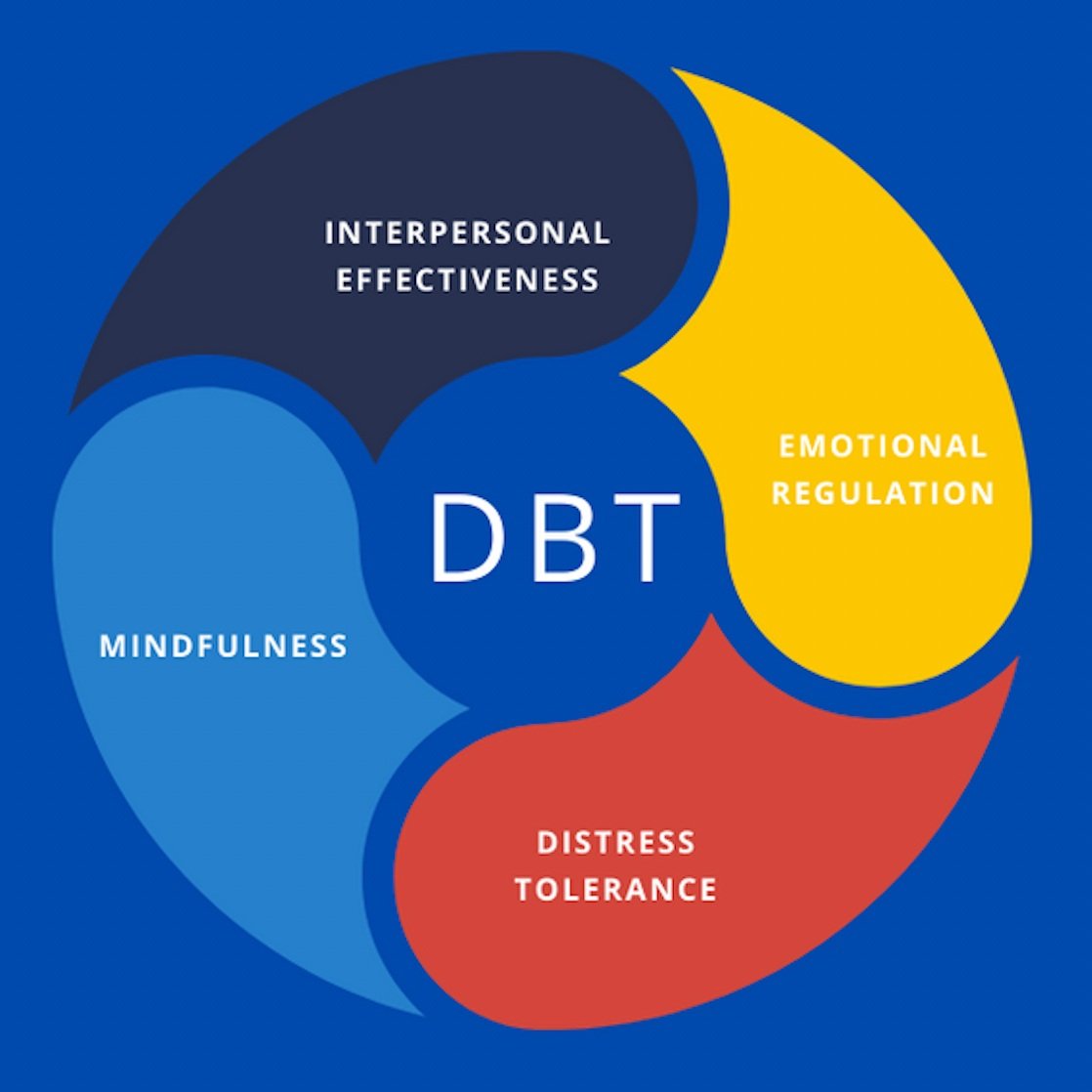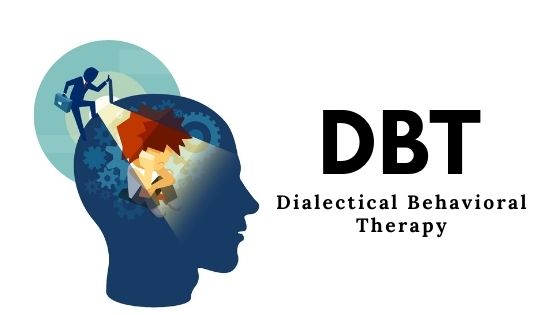Changing Lives: DBT London's Holistic Strategy to Recovery
Changing Lives: DBT London's Holistic Strategy to Recovery
Blog Article
Encouraging People Through Efficient Dialectical Behavior Treatment (DBT) Providers: Structure Stronger Mental Wellness Foundations
In the realm of mental wellness and health, the relevance of equipping individuals through reliable Dialectical Behavior Therapy (DBT) services can not be overstated. By concentrating on the core principles of DBT, such as enhancing psychological guideline skills, boosting social effectiveness, constructing distress resistance techniques, and growing mindfulness methods, individuals can begin on a journey in the direction of structure stronger psychological health foundations.
Recognizing the Core Principles of DBT


One core principle of DBT is validation. Specialists utilizing DBT acknowledge the person's sensations and habits as valid responses to their atmosphere. This validation helps develop a strong restorative alliance and encourages patients to work towards change. Another fundamental element is dialectics, which educates people to view circumstances from numerous perspectives and discover the synthesis in between conflicting thoughts or feelings.
Moreover, the principle of dialectical abstaining is central to DBT. This principle motivates individuals to stay away from suicidal actions while additionally accepting themselves. By understanding and integrating these core concepts, specialists can successfully execute DBT techniques and support individuals in their journey towards emotional policy and mental wellness.
Enhancing Emotional Policy Skills
Establishing efficiency in handling emotions is an essential aspect of fostering psychological well-being and interpersonal effectiveness - DBT London. Enhancing psychological law abilities is a core part of Dialectical Practices Treatment (DBT) that furnishes individuals with the tools to navigate intense emotions in a healthy and balanced and positive fashion. With DBT, people discover to determine, comprehend, and control their emotions, resulting in improved mental health end results
DBT stresses the relevance of mindfulness, which includes existing in the moment without judgment. This practice permits people to observe their emotions without coming to be bewildered by them, improving their ability to react properly instead of react impulsively. By cultivating mindfulness, individuals can create a better feeling of self-awareness and emotional control.
Furthermore, DBT educates practical abilities such as distress resistance and emotion policy methods to aid individuals handle tough emotions. By finding out these skills, people can minimize impulsive habits, improve decision-making, and reinforce their connections with others. Ultimately, improving emotional guideline skills with DBT empowers individuals to lead even more satisfying and well balanced lives.

Improving Interpersonal Performance
Having established a solid structure in psychological law abilities within the framework of Dialectical Practices Treatment (DBT), the emphasis currently shifts towards improving interpersonal efficiency. Improving interpersonal effectiveness is a vital part of DBT as it furnishes people with the required skills to navigate social communications, connect properly, established limits, and develop healthier relationships.
In DBT, social efficiency skills are instructed through components that learn this here now concentrate on areas such as assertiveness, effective communication, and social analytical. By learning these skills, people can improve their ability to share their demands and wishes, keep dignity, and develop stronger links with others.
Practicing mindfulness is an indispensable part of boosting interpersonal effectiveness within the DBT structure. Mindfulness allows people to be existing in their interactions, pay attention proactively, and respond attentively instead of react impulsively. By incorporating mindfulness right into their daily lives, people can cultivate better self-awareness and emotional law, which are vital for effective interpersonal interactions.
Building Distress Tolerance Techniques
Discovering effective techniques for handling emotional distress is necessary for people looking for to enhance their coping skills and resilience. Building distress tolerance techniques is an important facet of Dialectical Practices Treatment (DBT) that encourages people to browse difficult feelings without ending up being overloaded.
Moreover, mindfulness practices play a significant role in building distress resistance. Mindfulness urges people to remain existing in the moment without judgment, allowing them to observe their thoughts and feelings without reacting impulsively. This awareness you could try this out makes it possible for people to endure distress a lot more successfully and establish a greater sense of control over their reactions.
In enhancement to these methods, producing a tailored distress resistance strategy with the assistance of a qualified therapist can provide individuals with a tailored approach to taking care of psychological distress - DBT London. By integrating these strategies right into day-to-day live, people can reinforce their mental health structures and improve their overall health

Cultivating Mindfulness Practices
To deepen their distress resistance strategies further, individuals can focus on growing mindfulness techniques as a complementary method within the structure of Dialectical Practices Treatment (DBT) Mindfulness, a key part of DBT, involves taking notice of the present minute without judgment. By cultivating mindfulness, individuals can enhance their recognition of thoughts, emotions, and physical sensations, advertising a deeper understanding of themselves and their experiences.
Mindfulness methods in DBT include techniques such websites as mindful breathing, body scans, and observing thoughts without attachment. These practices encourage people to create a non-reactive position in the direction of their inner experiences, enabling them to reply to challenging situations with greater clearness and calmness. By incorporating mindfulness right into day-to-day regimens, individuals can learn to manage their feelings better, lower spontaneous habits, and cultivate a sense of internal tranquility.
With cultivating mindfulness practices, people going through DBT can develop a strong foundation for handling tension, improving partnerships, and boosting general well-being. By incorporating mindfulness right into their therapeutic trip, individuals can develop beneficial abilities that empower them to navigate life's obstacles with strength and self-awareness.
Final Thought
In conclusion, reliable Dialectical Behavior Therapy (DBT) solutions play a critical function in empowering people to develop more powerful mental health foundations. By recognizing the core principles of DBT, boosting emotional regulation abilities, improving social performance, developing distress resistance techniques, and growing mindfulness practices, people are equipped with the needed devices to browse their emotions, partnerships, and obstacles in a more durable and adaptive way. DBT solutions provide a comprehensive technique to promoting psychological wellness and encouraging individuals to lead satisfying lives.
By concentrating on the core principles of DBT, such as improving emotional guideline abilities, improving interpersonal performance, building distress tolerance methods, and growing mindfulness methods, people can begin on a trip towards building more powerful mental health and wellness structures. Enhancing psychological regulation skills is a core element of Dialectical Practices Therapy (DBT) that gears up people with the devices to browse extreme emotions in a healthy and constructive manner.Moreover, DBT educates practical skills such as distress tolerance and feeling policy methods to assist people manage challenging emotions.To grow their distress tolerance methods additionally, people can concentrate on growing mindfulness methods as a corresponding strategy within the structure of Dialectical Practices Treatment (DBT) By recognizing the core concepts of DBT, boosting psychological law abilities, enhancing social efficiency, developing distress tolerance techniques, and cultivating mindfulness techniques, people are outfitted with the essential devices to navigate their emotions, relationships, and obstacles in an extra flexible and durable fashion.
Report this page